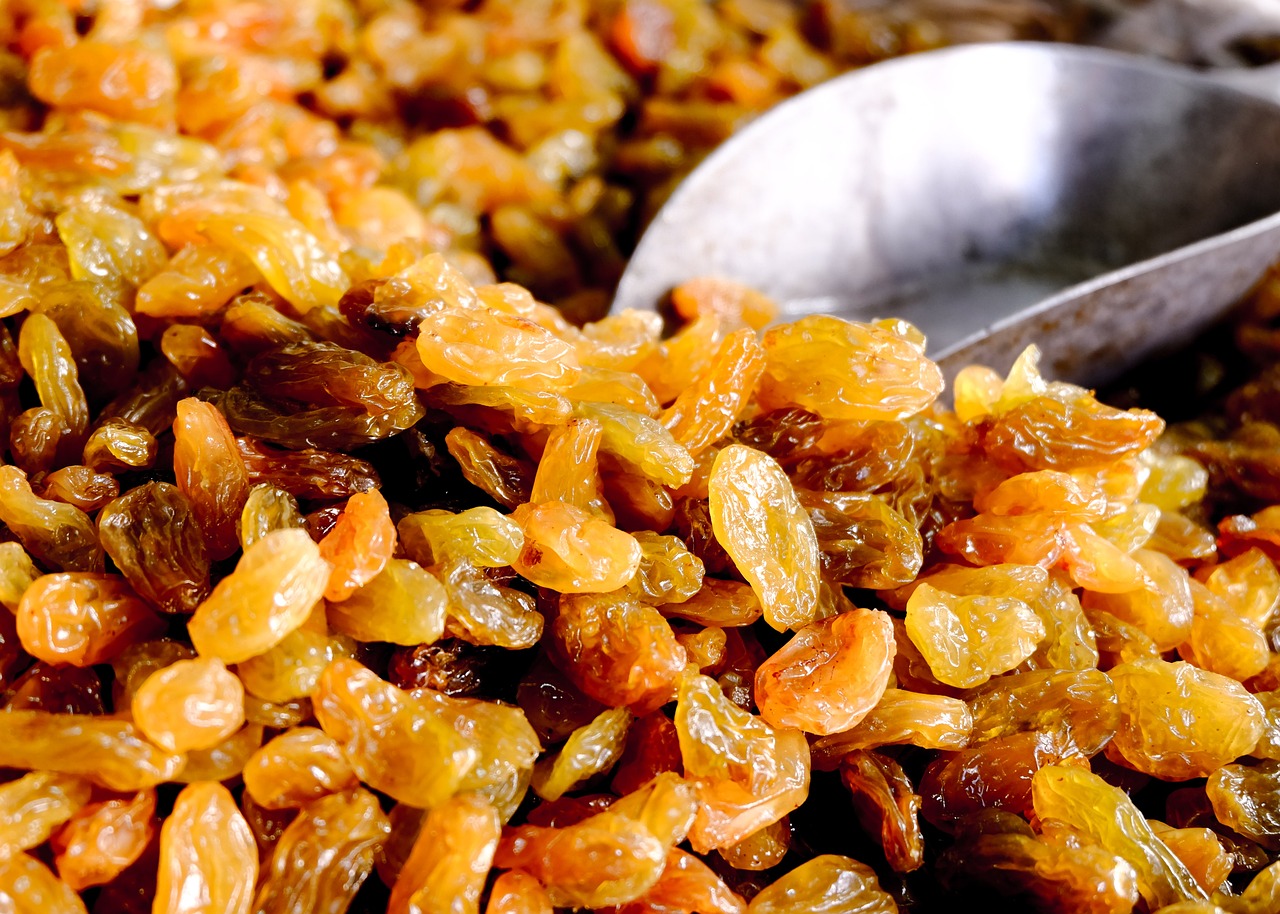
Raisins, small dried grapes, are highly nutritious and offer various health benefits. They can easily enhance meals, from breakfast to snacks. Nutritionally, raisins contain about 299 calories per 100 grams, with 79 grams of carbohydrates primarily from natural sugars. They also provide about 3.7 grams of dietary fiber, essential B vitamins, vitamins C, E, and K, and vital minerals like potassium, calcium, iron, magnesium, phosphorus, and copper. Additionally, raisins contain antioxidants such as polyphenols and flavonoids. The article discusses how raisins can benefit digestion, heart health, skin care, and more.
- Boosts Digestive Health- Raisins are beneficial for digestion due to their high fiber content, acting as a natural laxative that aids those with constipation. They promote regular bowel movements by softening stools and support gut health by fostering the growth of healthy gut bacteria, which enhances overall digestion.
- Improves Heart Health- Heart disease is a major global health concern, but incorporating raisins into your diet can benefit heart health. Raisins help lower blood pressure due to their high potassium content, which relaxes blood vessels and counters sodium’s effects. They also lower bad cholesterol levels through their fiber, which binds with bile and reduces cholesterol absorption. Additionally, raisins are rich in antioxidants that protect the heart by reducing inflammation and oxidative stress, both of which are linked to cardiovascular disease.
- Promotes Bone Health- Bone health is crucial for mobility and quality of life, particularly in older age. Raisins provide key nutrients that enhance bone strength and density. They are rich in calcium, which is essential for strong bones and teeth, and help prevent osteoporosis and fractures. Additionally, raisins are a good source of boron, which facilitates the absorption of calcium, magnesium, and phosphorus, all important for bone health. The magnesium content in raisins also contributes to the formation and maintenance of healthy bone structure.
- Supports Weight Management- Raisins can aid in weight management when eaten in moderation due to their high fiber content, which promotes fullness and helps prevent overeating. Additionally, their low to moderate glycemic index means they do not significantly spike blood sugar levels, making them a good snack choice for weight and blood sugar management.
- Enhances Skin Health- Raisins are beneficial for skin health due to their antioxidants, vitamins, and minerals. Their antioxidants, including polyphenols and flavonoids, protect the skin from free radical damage, aiding in the prevention of premature aging and wrinkles. The natural sugars in raisins help retain moisture, promoting hydration and a glowing complexion. Moreover, their anti-inflammatory properties can reduce acne occurrences, while their antioxidants assist in detoxifying the bloodstream, decreasing the likelihood of breakouts.
- Boosts Iron Levels- Iron deficiency anemia is prevalent, particularly among women and vegetarians. Raisins are a strong plant-based source of iron, beneficial for enhancing iron intake. They aid in the production of red blood cells and can help prevent symptoms of anemia like fatigue and weakness. Additionally, raisins contain vitamin C, which improves the absorption of non-heme iron, making them an effective choice for boosting iron levels.
- Improves Eye Health- Raisins are beneficial for eye health due to their nutrients that help prevent age-related vision issues. They are rich in antioxidants like polyphenols, which guard the eyes against damage from free radicals and oxidative stress, potentially preventing cataracts and macular degeneration. Additionally, raisins provide vitamin A, crucial for maintaining healthy vision by protecting the eye’s surface and supporting retina function.
- Supports Kidney Health- Kidney health is essential for waste filtration and fluid balance in the body. Raisins support kidney health by promoting detoxification through their fiber, which aids in removing toxins from the digestive tract. Additionally, their potassium content helps prevent kidney stones by lowering calcium oxalate levels in urine.
Additional tips- Raisins can be easily incorporated into meals for health benefits. They can be added to cereal or oatmeal for sweetness and fiber. A mix of raisins with nuts, seeds, and dried fruits makes a healthy trail mix. They enhance salads, particularly with spinach and goat cheese. Raisins can also be included in baked goods such as muffins and cookies, and are a nutritious addition to smoothies and yogurt. In Middle Eastern cuisine, they are often used in rice dishes like pilafs to balance savory flavors.
-Triparna







